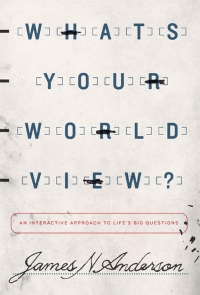What's Your Worldview? - a review
CYOA. Not an acronym you come across in everyday life, but I bet you know the concept. It stands for “choose your own adventure” and describes a book where you’re involved in how the story flows. At various points it will say “if you choose X, turn to page 43; if you choose Y, turn to page 64.” James N. Anderson’s What’s Your Worldview? is a CYOA book. The premise is simple: using the CYOA format, Anderson leads the reader to a label that best describes their fundamental beliefs about reality – their worldview.
 Writing conversationally, Anderson begins with the most general questions about our experience of reality such as “Do you have the power to make free choices?” and “Is there any objective truth?” From there we proceed to slightly more specific questions about the source and nature of reality itself – “Is everything ultimately material in nature?” and “Is there a God?” If you get this far down the trail, next come questions about the nature of God (“Is God a personal being?”, “Has God communicated with humans?”), before finally the nitty gritty questions that distinguish one religious belief from the next – “Did Jesus of Nazareth rise from the dead?”, “Was Muhammad a true prophet of God?” Of course, you might be sent down another trail long before you get to these, but at some point in the middle of the above process, you will be directed to one of five general categories (e.g. “Atheist worldviews” and “Theist worldviews”), which are then refined with the later questions.
Writing conversationally, Anderson begins with the most general questions about our experience of reality such as “Do you have the power to make free choices?” and “Is there any objective truth?” From there we proceed to slightly more specific questions about the source and nature of reality itself – “Is everything ultimately material in nature?” and “Is there a God?” If you get this far down the trail, next come questions about the nature of God (“Is God a personal being?”, “Has God communicated with humans?”), before finally the nitty gritty questions that distinguish one religious belief from the next – “Did Jesus of Nazareth rise from the dead?”, “Was Muhammad a true prophet of God?” Of course, you might be sent down another trail long before you get to these, but at some point in the middle of the above process, you will be directed to one of five general categories (e.g. “Atheist worldviews” and “Theist worldviews”), which are then refined with the later questions.
In the end, the trail will lead you to one of no fewer than 21 worldviews! They vary from familiar religious labels (“Christianity”, “Islam”) and other theistic standpoints (“Polytheism”, “Pantheism”, “Platonism”), to assorted atheistic positions (“Materialism”, “Atheistic Idealism”) and views that aren’t to do with God at all (“Relativism”, “Nihilism”), not to mention one or two that you may never have even heard of (“Finite Godism”, “Pelagianism”, “Monism”)!
I wish I had read this when I was at school, or shortly after
Perhaps the greatest compliment I can pay this book is that I wish I had read it when I was at school, or at least shortly after. At that age, I was blindly naïve to the diversity of beliefs that existed, thinking there to be simply Christianity, atheism, and other religions. For many years, even through university, I found myself unable to understand why people believed certain things. This book simply (but not simplistically) helps to explain ‘the beliefs behind the belief’. These are the underlying beliefs that many (if not most) people don’t even realise they hold that determine the beliefs they hold consciously.
Anderson writes with great clarity. Nearly every summary of the 21 worldviews listed begins with a sentence plainly stating what the belief consists of at its core. For example, “Skepticism is the view that even if there is objective truth, none of us can know what that truth is.” After a little expansion on this, we are then given a little historical and/or social context as to its origins and practice, before he concludes by throwing in a few unanswered questions, which he feels represent the worldview’s greatest challenges.
The book’s few shortcomings are obvious, in fact so obvious that Anderson anticipates them in his useful appendix. These are chiefly (1) that it is clearly written from a Judaeo-Christian outlook and so excludes specific discussion of many of the so-called “Eastern” religions, and (2) that it is reasonably simple, whereas the content of what it’s discussing is surely very complex. Indeed, one of the commendations of the book on the inside front cover begins “Not the last word on worldviews, but quite possibly the first!” I must admit when I first read that, I thought the reviewer was being rather rude. In truth, he’s merely quoting the appendix, where Anderson defends the fact that the material is inevitably simplified a little.
Anderson writes for anyone of any worldview
However, that it might be “quite possibly the first” word on worldviews deserves greater attention, by which I mean that this book is the perfect introduction to the concept of worldview. If you are someone who finds the whole concept of worldview a bit foreign, this book will help you understand the huge variety of underlying beliefs about the world that people all around you may hold. It’ll help you understand them better. Moreover, it doesn’t matter whether you’re Christian, atheist, of a different religion, or anywhere in between. Anderson writes for anyone of any worldview.
I would certainly recommend this as the first port of call for teenagers, and youth workers seeking to explain this sort of thing to those in their care. That it’s in the CYOA format also gives it a novelty factor that should persuade even those who aren’t big readers to give it a try. I’d also recommend it to students and church workers if they’re seeking something on this topic that’s not too heavy. If you’re wanting something a little more in depth, I’d recommend James Sire’s The Universe Next Door.
Anderson’s stated aim for the book is to “provoke you to think more self-consciously and critically about your worldview and the worldviews of others”. If you eventually read every page of it, as I did, rather than only following your own trail, you will find that it most certainly achieves that.



